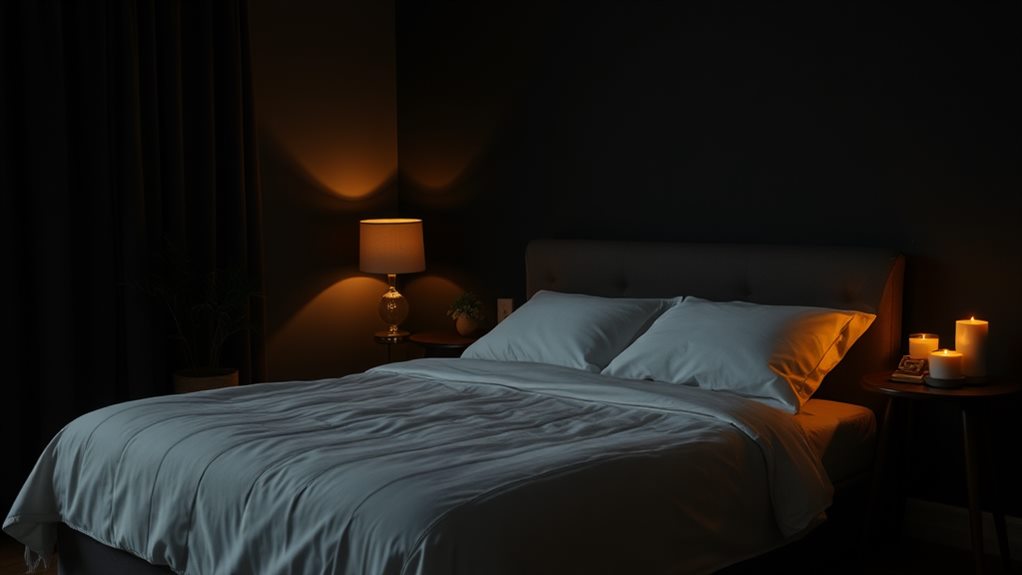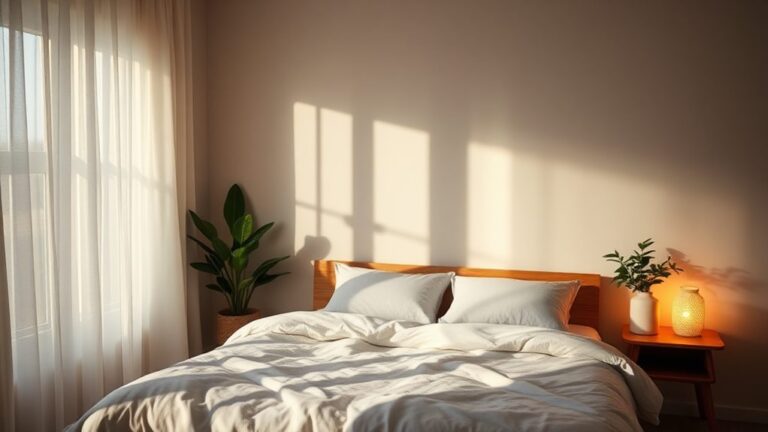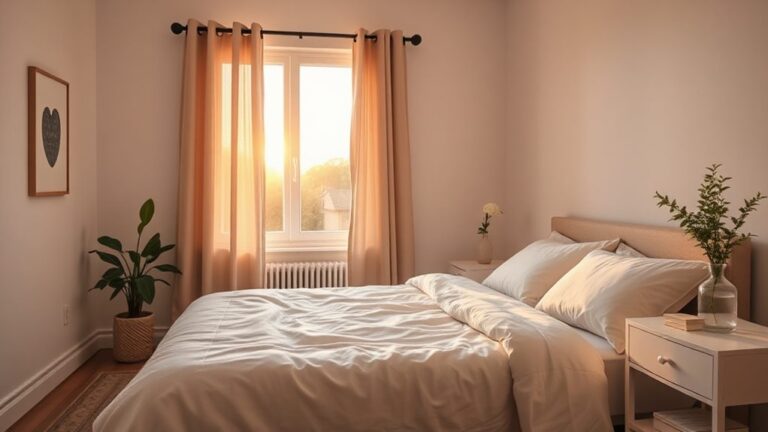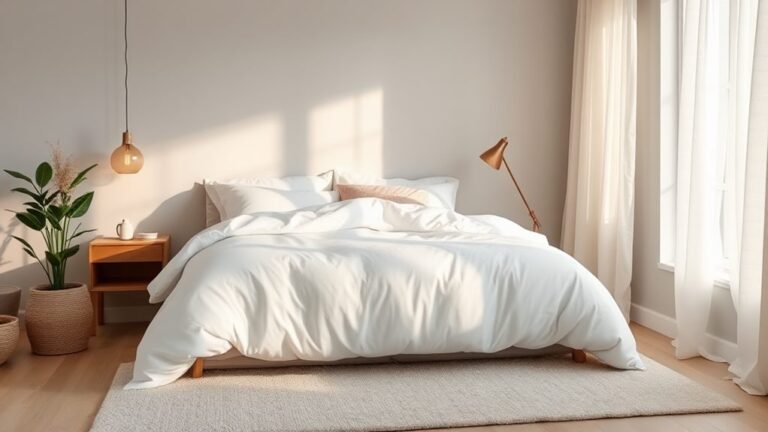You can transform your sleep in just three simple steps. First, set a consistent sleep schedule to regulate your body's internal clock, making it easier to fall asleep and stay asleep. Next, develop a calming pre-sleep routine that signals your body to relax, such as reading, taking a warm bath, or practicing gentle stretches. Finally, optimize your sleep environment by considering lighting, temperature, and noise levels in your bedroom. By taking these steps, you'll be well on your way to a deeper, more restorative night's sleep, and you'll discover even more ways to wake up feeling refreshed and revitalized.
Nightcap Notes
- Establish a consistent sleep schedule to regulate your body's internal clock and improve sleep quality.
- Develop a calming pre-sleep routine with activities like reading, warm baths, or gentle stretches to signal relaxation.
- Optimize your sleep environment by considering lighting, temperature, and noise levels to create a sleep sanctuary.
- Incorporate soothing herbal teas, such as those found in Sip to Sleep, into your pre-sleep routine to promote relaxation.
- Limit exposure to screens and electronic devices before bedtime to minimize disruptions to your sleep-wake cycle.
Set a Consistent Sleep Schedule
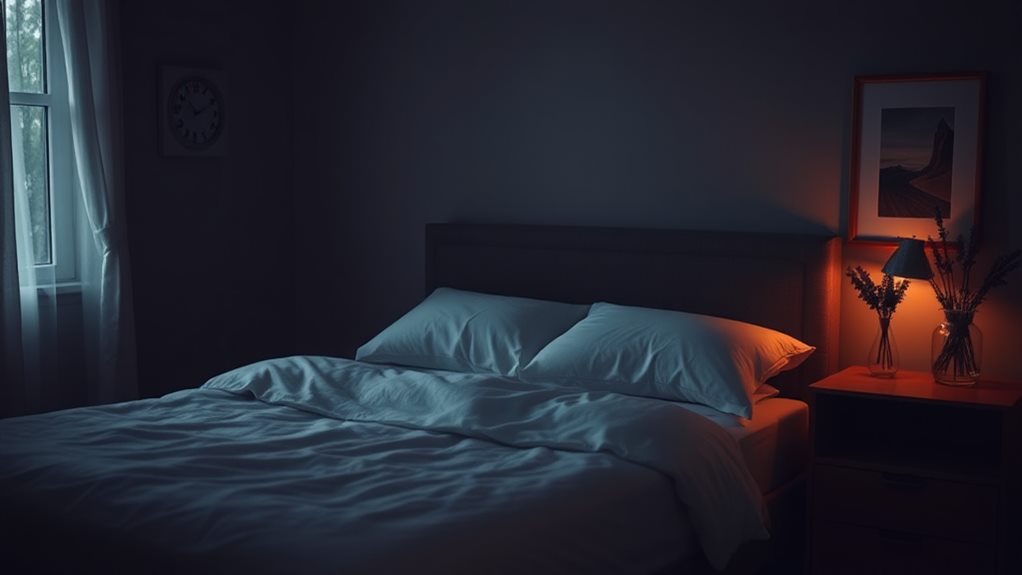
As you establish a bedtime routine, setting a consistent sleep schedule is crucial from signaling to your body that it's time to wind down and prepare for rest.
You go to bed and wake up at the same time every day, including weekends. This consistency helps regulate your body's internal clock, making it easier to fall asleep and stay asleep.
Insomnia-fighting tips Sleep Better Tonight often recommend establishing a relaxing bedtime routine to signal to your body that it's time to sleep.
By incorporating sleep hygiene practices into your daily routine, you can improve the quality of your sleep.
By setting a consistent sleep schedule, you're training your body to feel tired at the same time every day.
This helps you avoid the frustration of lying awake at night, feeling tired but unable to sleep.
A consistent sleep schedule also improves the quality of your sleep.
When you go to bed and wake up at the same time every day, you're more likely to get the deep, restorative sleep you need to feel rested and refreshed.
Sticking to a consistent sleep schedule can be challenging, especially on weekends or during vacations.
However, the benefits to your sleep and overall health make it worth the effort.
Develop a Calming Pre-Sleep Routine
Developing a calming pre-sleep routine is crucial for signaling to your body that it's time to relax and prepare for a restful night's sleep.
You start by doing something that calms your mind and body, such as reading a book, taking a warm bath, or practicing gentle stretches. These activities help slow down your heart rate, lower your blood pressure, and calm your nervous system.
For an added calming effect, consider sipping on soothing herbal teas, such as those found in Sip to Sleep, which can promote relaxation and reduce stress. Drinking herbal tea can also help regulate your body's internal clock, making it easier to fall asleep.
As you develop your pre-sleep routine, consider activities that bring you joy and relaxation.
If you're an avid reader, choose a book that's not too stimulating or exciting. If you prefer a warm bath, add some calming essential oils like lavender or chamomile to enhance the experience.
You can also try listening to soothing music, practicing deep breathing exercises, or doing some light meditation. The key is to find what works for you and stick to it consistently.
Optimize Your Sleep Environment
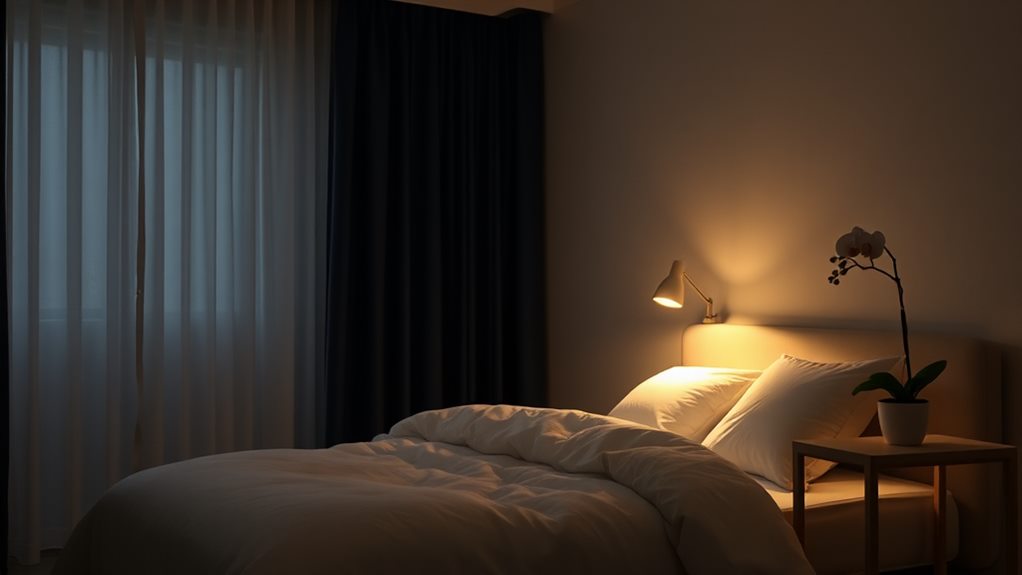
While a calming pre-sleep routine is essential for signaling to your body that it's time to sleep, an optimized sleep environment plays a crucial role in helping you stay asleep.
You want your bedroom to be a sleep sanctuary, a space that promotes relaxation and helps you unwind. To create this haven, you need to ponder the lighting, temperature, and noise levels in your bedroom.
For instance, installing blackout curtains can be a game-changer for blocking out harsh light, and improving bedroom sleep is easier than you think with the right window treatments. A cooler room temperature, around 60-67°F, can also promote better sleep.
Invest in earplugs, a white noise machine, or blackout curtains to minimize any noise that might be disrupting your sleep. Additionally, make sure your bed is comfortable and supportive. Ponder investing in a new mattress or pillows if you're waking up with aches and pains.
Frequently Asked Questions
Q: Can Certain Foods or Drinks Interfere With Deep Sleep Quality?
You're probably wondering if certain foods or drinks can interfere with your deep sleep quality.
The answer is yes, they can. You'll want to limit or avoid consuming heavy meals, caffeine, and sugary snacks close to bedtime.
These can disrupt your body's natural sleep-wake cycle and reduce the quality of your deep sleep.
You should also steer clear of stimulating drinks like energy drinks and soda in the hours leading up to bedtime.
Q: How Does Physical Activity Impact Deep Sleep, and When Is Best to Exercise?
You boost your energy with physical activity, but you also boost your sleep quality – or do you?
Regular exercise can both help and hinder deep sleep. You'll reap benefits from morning or early-afternoon workouts, as physical activity can increase alertness.
However, you shouldn't exercise within three to four hours of bedtime, as it can actually disrupt deep sleep patterns and reduce the quality of your sleep.
Q: Can Electronic Devices Be Used During the Pre-Sleep Routine?
You're wondering if electronic devices can be used during your pre-sleep routine.
While it's tempting to scroll through your phone or watch a show, the blue light emitted from these devices can suppress melatonin production, making it harder to fall asleep.
You'll want to avoid screens for at least an hour before bedtime or use blue light filtering glasses or apps. This helps signal to your brain that it's time to sleep.
Q: How Long Does It Take for a New Bedtime Routine to Become Effective?
You're probably wondering how long it'll take for your new bedtime routine to kick in.
The answer is, it varies from person to person, but you can start noticing improvements in your sleep quality within 3-7 days.
As you stick to your routine, your body will adjust, and you'll likely experience better deep sleep within 2-4 weeks.
Consistency is key, so keep at it, and you'll be sleeping like a baby in no time!
Q: Can a Bedtime Routine Help With Sleep Disorders or Insomnia?
You're struggling with sleep disorders or insomnia, and you're wondering if a bedtime routine can help.
The answer is yes! Establishing a consistent bedtime routine can signal to your brain that it's time to sleep, helping to regulate your body's internal clock.
Conclusion
You've got the tools to upgrade your sleep game! By setting a consistent sleep schedule, developing a calming pre-sleep routine, and optimizing your sleep environment, you'll be sleeping like a baby in no time. Did you know that a staggering 37% of adults report not getting enough sleep? Don't be part of that statistic. Stick to your new bedtime routine and get ready to wake up feeling refreshed and ready to take on the day!

